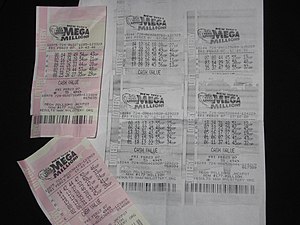 Image via WikipediaOne of my newly acquired coworkers approached me a couple of days ago and asked it I wanted to chip in for the company Lottery tickets. Apparently, a majority of the people where I work (including the owner, if that tells you anything) create a Lottery pool when ever the Mega Millions jackpot climbs over $300 Million. I guess they figure chump change like $200 Million isn't worth the effort.
Image via WikipediaOne of my newly acquired coworkers approached me a couple of days ago and asked it I wanted to chip in for the company Lottery tickets. Apparently, a majority of the people where I work (including the owner, if that tells you anything) create a Lottery pool when ever the Mega Millions jackpot climbs over $300 Million. I guess they figure chump change like $200 Million isn't worth the effort.I am not a gambler. I enjoy games and healthy competition, and the occasional wager between friends can be fun and challenging. But as soon as gambling is orchestrated and controlled by an organization with the direct intent of making money, it becomes a situation in which you are being asked to dedicate yourself financially to a system that has been specifically orchestrated to ensure your failure in the majority of possible outcomes. Much like borrowing or investing money with banks these days, you're screwed the minute you open your wallet.
This isn't a position I take on any kind of logically superior level. I am purely adverse to gambling from emotional standpoint: like many people, I don't like to lose. I'm not obsessive about it; I don't fly into a rage when a scrabble partners plays Quartzy on a Triple Word score or cheat at miniature golf. But to me, gambling has always felt like defeat without any real promise of success. I've patronized a few casinos in my day, and the stench of desperation and hopeless persistence is always overwhelming. I can almost see the pleasure in some of it - Slot machines, for example, have evolved to the point where they are merely arcade games for unimaginative adults. Of course, as a kid, I could milk a couple of hours at the arcade out of a measly $5; the same amount of time hanging out at even the nickel slots can cost you the same as a month's worth of groceries ("What do you mean, seventy-five lines? Why did one turn on a nickel slot just cost me $3.75?). During my last trip to the local Sands Casino, I paid a brief visit to the High Roller Slots Area, just to see what people willing to take a $500 pull on a one-armed bandit look like. Frighteningly enough, they look just like you and me, just with nicer clothing.
As if that isn't bad enough, anything above slots descends into the bizarre realm of casual and somewhat civilized thuggery. Those slightly jovial people with the intense stares at the $10 blackjack table might seem innocent enough, but all it takes is ten or twelve hands for you to realize that the middle-aged mother of three (celebrating her third honeymoon) on your right and the overworked insurance salesman (in town for yet another trade show) on your left are both more than willing to shove the plastic straw from their complimentary drink in your eye if you mistakenly hit when you aren't "supposed" to and inadvertently take "their" card. Desperation can make people behave irrationally, but those who actively seek out desperation are a dangerous breed all their own. The twisted souls populating the Keno and Roulette tables are the most unstable of the bunch, and should be approached with extreme cation. The person who willingly places bets on a game in which they are fully aware that odds are firmly against them, only to become angry or disappointed when the law of averages declares them losers, is an unpredictable creature that demands equal amount of pity and respect, but only at a safe distance.
Of course, we aren't talking about table games or slot machines. My coworkers would simply like me to chip in on buying lottery tickets so as to increase their chance of beating the three-million-to-one odds against them by a fraction of a percent. It's all in good fun, but my natural inclination is to politely decline. Even when in good company, I still cannot find the joy in purposely setting myself up for yet another loss.
Then a frightening possibility occurs to me: what if they win? What if I politely decline to join in their office lottery pool, only to have my coworkers strike the jackpot. It would just be my luck to end up in an empty office on a Monday morning with everyone having called out sick to celebrate, with them mulling over stock portfolios while I process payroll for a bunch of nouveau riche, soon to be ex-coworkers.
So, I chipped in three dollars. Because the only thing worse than losing is being the only loser in the building.
PS - We didn't win.
This isn't a position I take on any kind of logically superior level. I am purely adverse to gambling from emotional standpoint: like many people, I don't like to lose. I'm not obsessive about it; I don't fly into a rage when a scrabble partners plays Quartzy on a Triple Word score or cheat at miniature golf. But to me, gambling has always felt like defeat without any real promise of success. I've patronized a few casinos in my day, and the stench of desperation and hopeless persistence is always overwhelming. I can almost see the pleasure in some of it - Slot machines, for example, have evolved to the point where they are merely arcade games for unimaginative adults. Of course, as a kid, I could milk a couple of hours at the arcade out of a measly $5; the same amount of time hanging out at even the nickel slots can cost you the same as a month's worth of groceries ("What do you mean, seventy-five lines? Why did one turn on a nickel slot just cost me $3.75?). During my last trip to the local Sands Casino, I paid a brief visit to the High Roller Slots Area, just to see what people willing to take a $500 pull on a one-armed bandit look like. Frighteningly enough, they look just like you and me, just with nicer clothing.
As if that isn't bad enough, anything above slots descends into the bizarre realm of casual and somewhat civilized thuggery. Those slightly jovial people with the intense stares at the $10 blackjack table might seem innocent enough, but all it takes is ten or twelve hands for you to realize that the middle-aged mother of three (celebrating her third honeymoon) on your right and the overworked insurance salesman (in town for yet another trade show) on your left are both more than willing to shove the plastic straw from their complimentary drink in your eye if you mistakenly hit when you aren't "supposed" to and inadvertently take "their" card. Desperation can make people behave irrationally, but those who actively seek out desperation are a dangerous breed all their own. The twisted souls populating the Keno and Roulette tables are the most unstable of the bunch, and should be approached with extreme cation. The person who willingly places bets on a game in which they are fully aware that odds are firmly against them, only to become angry or disappointed when the law of averages declares them losers, is an unpredictable creature that demands equal amount of pity and respect, but only at a safe distance.
Of course, we aren't talking about table games or slot machines. My coworkers would simply like me to chip in on buying lottery tickets so as to increase their chance of beating the three-million-to-one odds against them by a fraction of a percent. It's all in good fun, but my natural inclination is to politely decline. Even when in good company, I still cannot find the joy in purposely setting myself up for yet another loss.
Then a frightening possibility occurs to me: what if they win? What if I politely decline to join in their office lottery pool, only to have my coworkers strike the jackpot. It would just be my luck to end up in an empty office on a Monday morning with everyone having called out sick to celebrate, with them mulling over stock portfolios while I process payroll for a bunch of nouveau riche, soon to be ex-coworkers.
So, I chipped in three dollars. Because the only thing worse than losing is being the only loser in the building.
PS - We didn't win.




